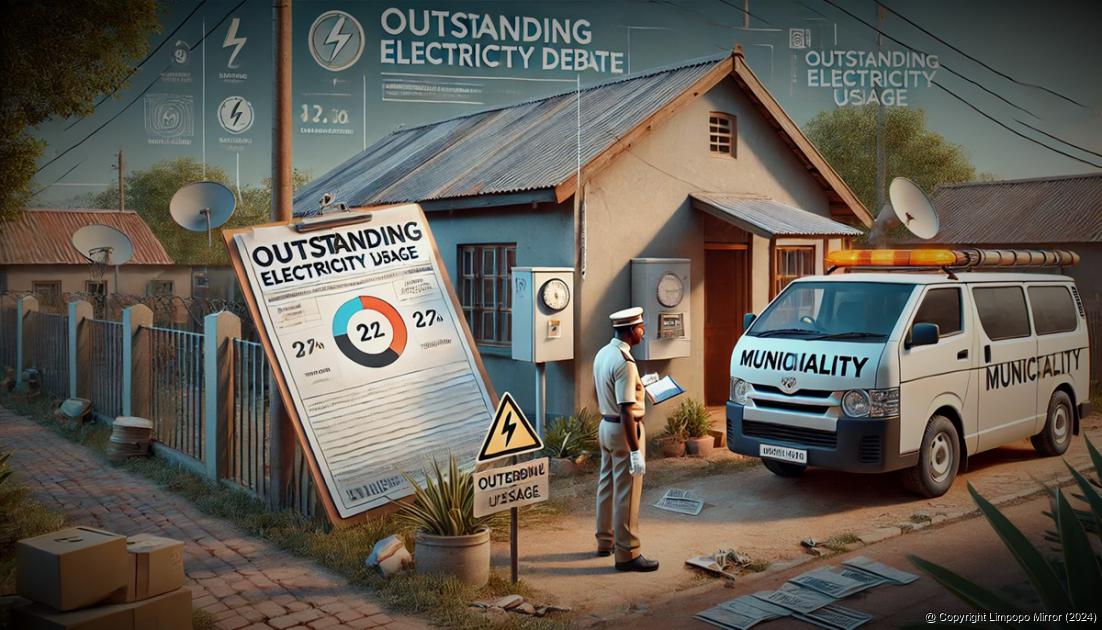

ADVERTISEMENT:


Makhado Municipal spokesperson Mr Mpho Rathando, upon enquiry, admitted that the municipality has intensified its debt-collection efforts. “The only reason for that is to reduce the debt book to a reasonable level,” said Rathando. Generic image.
Consumers seek legal help as municipality comes to collect
More and more property owners are finding themselves at loggerheads with the Makhado Municipality over outstanding electricity accounts, with the situation further exacerbated by the municipality’s renewed efforts to collect unpaid debts. As the conflict escalates, many local taxpayers are being forced to seek legal assistance to mediate payments.
The nature of complaints varies, but many cases share a common factor: the municipality is attempting to collect on debt that has prescribed. Prescribed debt refers to debt that is no longer legally enforceable because too much time has passed without the creditor taking action. In South Africa, for example, if a debtor has not acknowledged the debt, made any payments, or the creditor has not taken legal steps within a specified period (usually three years for most types of debt), the debt becomes “prescribed.”
According to the Prescription Act 68 of 1969, a debt is prescribed if, during the preceding three years:
You have not acknowledged the debt, either verbally or in writing;
No payments have been made towards the outstanding amount;
No summons has been issued or served on you.
It is important to note that consumption charges (water and electricity) typically prescribe after three years from the date they become due. However, other municipal charges—such as property rates and basic charges—carry a longer prescription period of 30 years.
Why is this important?
Municipalities have a legal duty to recover money owed to them for services rendered. Section 96 of the Local Government: Municipal Systems Act 32 of 2000 mandates that municipalities must collect all payments due to them and implement a credit-control and debt-collection policy that aligns with their tariff and rates policies. This ensures that municipalities fulfil their constitutional and statutory obligations regarding revenue collection.
Administrative challenges
Many municipalities struggle with debt collection, and the Makhado Municipality is no exception. Problems with issuing monthly accounts are well-documented, just one of many administrative hurdles the municipality faces.
“I wouldn’t describe the accounts department as chaotic, but there are definitely issues,” said Zander Goedhals, practising attorney at H Liebenberg Inc.
Goedhals acknowledged that, in many cases, the debt claimed by the municipality is indeed valid. However, he pointed out that some outstanding electricity debts date back nearly a decade. He said the taxpayer could not be penalised for the municipality’s failure to perform its duties, such as taking monthly meter readings. "Even in cases where a person has a dispute with the municipality over electricity charges, they are still required to pay their property rates, refuse collection, sewage, basic service charges and current consumption," said Goedhals.
Coercion and disconnection
Taxpayers complain that they are being coerced into paying under duress, with threats of their electricity being cut off. In some instances, consumers are forced to enter into repayment agreements, which amount to an acknowledgment of debt. This affects everyone—individuals, businesses, and even farmers.
Some debtors have reached payment agreements with the municipality to settle their accounts. Section 95(f) of the Municipal Systems Act requires municipalities to provide mechanisms for consumers to query or verify accounts, along with appeal procedures for resolving disputes over inaccurate charges. These mechanisms must be accessible and capable of resolving issues promptly, within the municipality’s financial and administrative capacity. A dispute arises when these provisions are not properly followed, especially when consumers challenge the accuracy of amounts claimed by the municipality. In some cases where a legal dispute is lodged, the municipality still cuts electricity supply.
Consolidation of accounts
Another issue raised by taxpayers involves the municipality’s practice of consolidating accounts across different legal entities. It sounds strange, but the law permits this. Section 102, read together with Section 95 of the Municipal Systems Act, allows municipalities to consolidate accounts, credit payments across multiple accounts, and implement debt-collection measures—except when there is a dispute over a specific amount. This provision ensures that municipalities cannot enforce collection actions when a legitimate dispute exists about the amount owed. Again, the issue of unresolved disputes remains problematic.
Municipality needs to collect
Makhado Municipal spokesperson Mr Mpho Rathando, upon enquiry, admitted that the municipality has intensified its debt-collection efforts. “The only reason for that is to reduce the debt book to a reasonable level,” said Rathando.
According to the Makhado Municipality’s pre-audited financial statements for the year ended 30 June 2024, the municipality had a total consumer debtors balance of R558,418,829, of which outstanding electricity accounted for R103,093,659, or 18.46%, of the total debt. The outstanding electricity amount for the previous year, ending 30 June 2023, was R97,996,925, which represented 20.52% of the total debtors’ book of R477,509,557. During 2023, the municipality allowed for an impairment of electricity totalling R59,242,733 (or 60.45% of the outstanding amount) and R42,319,597 in 2024 (or 41.05% of the total owed). It is worth mentioning that, of the outstanding electricity debt of R103,093,659 for the year ending 30 June this year, R54,016,911 (or 52.4%) was for current debt in the 0-30 days period, while R45,416,455 (or 44.05%) was for debt in the 121-365 days period.
Electricity debt only the third biggest problem
Just as a side note: outstanding electricity debt was the third-largest contributor to the total debtors’ book for the year ended 30 June 2024. In first place were rates amounting to R195,150,166, or 34.94% of the total debtors’ book. Of this amount, R21,609,670 (or 11.07%) was outstanding in the 0-30 days period, while the bulk of the outstanding debt, totalling R162,947,397 (or 83.49%), was for the 121-365 days period. This is alarming. In second place regarding outstanding debt was interest totalling R166,895,176, or 29.88% of the total debt of R558,418,829 (June 2024). The bulk of this amount, totalling R149,777,461 or 89.74%, was for the 121-365 days outstanding period.
Municipality downplays legal action
Rathando was also asked for comments regarding the number of civil legal proceedings against the municipality, specifically concerning electricity issues. “The municipality is not aware of a large number of pending cases. Kindly provide us with documentation or details, so that we can be informed about this matter,” said Rathando. Additionally, just for interest's sake, for the year ending 30 June 2023, the Makhado Municipality spent R271,625,842 on legal and court battles, which is up 47.6% from the previous year.
When asked about the issue of debt that had prescribed, Rathando stated that they only collected on debt that had not prescribed. Legal arguments regarding this are likely to arise regarding which debts are considered to have prescribed under what circumstances. Regarding the issue of people's electricity being cut off despite having an unresolved dispute with the municipality, Rathando acknowledged that there are cases where this has occurred.
Concerning the consolidation of accounts, Rathando confirmed that they are doing this under Section 102(a) of the Municipal Systems Act. “The municipality conducts all its affairs within the ambit of the law and council policies, including the execution of credit control and debt collection,” said Rathando.
No account does not mean do not pay
To conclude, not receiving an account is no excuse for not paying. Section 27(3) of the Electricity Regulation Act 4 of 2006, which specifically addresses the responsibilities of consumers in relation to municipal accounts for electricity supply, is very clear on this matter. It states that even if the municipality makes an error, omits something, or fails to provide an account, the consumer is still obligated to pay for the electricity that has been supplied and consumed. Additionally, it is the consumer's responsibility to ensure that the account aligns with the prescribed tariffs, charges, and fees for the electricity supplied. This provision ensures that municipalities can still claim what they are owed, despite administrative errors or omissions, and that consumers are responsible for verifying their bills.
Regarding the issuing of accounts, Rathando stated that the municipality had several methods for doing this. “Accounts are sent to consumers via email, MMS, or postal address, depending on the consumer's instructions,” he said.
Date:18 October 2024
By: Andries van Zyl
Andries joined the Zoutpansberger and Limpopo Mirror in April 1993 as a darkroom assistant. Within a couple of months he moved over to the production side of the newspaper and eventually doubled as a reporter. In 1995 he left the newspaper group and travelled overseas for a couple of months. In 1996, Andries rejoined the Zoutpansberger as a reporter. In August 2002, he was appointed as News Editor of the Zoutpansberger, a position he holds until today.
Read: 273

ADVERTISEMENT

Sponsored Content
Alliance Fuel's TV giveaway creates unforgettable moments for lucky customers
After weeks of excitement and anticipation, Alliance Fuel announced the winners of their TV Giveaway competition. “A huge thank you to everyone who participated - you made this giveaway bigger and better than we ever imagined,” said the marketing team.

ADVERTISEMENT:

Recent Articles
-

'We were paid R150,000 to gun down SAMWU members'
18 October 2024 -

Consumers seek legal help as municipality comes to collect
18 October 2024 By Andries van Zyl -

Sport League Logs for 18 October 2024
18 October 2024 -

Papa Thile celebrates double SATMA nominations
18 October 2024 By Elmon Tshikhudo -

'We will close the taps'
18 October 2024 By Elmon Tshikhudo

ADVERTISEMENT

Popular Articles
-

Hillary Construction to rehabilitate old N1 through Musina
22 August 2024 -

From engineering dreams to fashion industry icon
25 August 2024 By Maanda Bele -

Tracing the roots of the dreaded Panga Man back to Vhembe
24 August 2024 By Anton van Zyl -

Ambitious project to extend railway line to Thohoyandou to ease traffic
28 September 2024 By Bernard Chiguvare -

Survivor recalls harrowing details of N1 crash that claims ten
29 August 2024 By Kaizer Nengovhela -

SABC Livhu is flying high amidst bullying claims
30 August 2024 By Maanda Bele -

At age 104, war veteran Sadiki only wishes for a toilet inside his house
31 August 2024 By Maanda Bele



